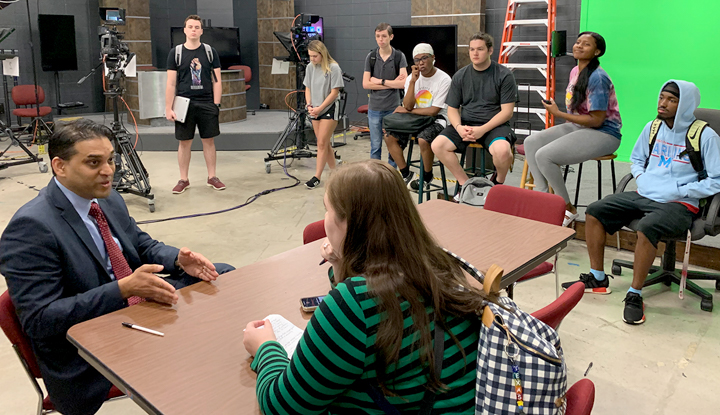
Ayan Mittra, Texas Tribune editor and Beaumont native, said the media landscape has changed a lot since he began his career as a journalism student at the University of Texas.
“Now, everything is constant,” the 1993 West Brook High School graduate, said. “You have to have a breaking news team that’s just focused on monitoring social media, or just press releases, or just news, to make sure that we’re getting it up before anyone else. In addition, you also have to balance that with enterprise work, where you’re actually talking through the work with the reporters to make sure you’re doing work that gives context and importance and value to people, beyond just the immediacy of breaking news.”
Mittra, who was on campus, Monday, to moderate a Texas Tribune panel discussion, said that even story sources have changed.
“We have people that are just basically monitoring Twitter or moderating a Facebook group,” he said. “All of these things kind of work together, and all these great ideas come out of those different platforms, and so they kind of fuel our reporting as well.
“There’s not just traditional sources that you get — we get sources from our audience in ways that we never could get it before. Before, the main interaction was just getting letters to the editor or phone calls. Now, you’re getting tweets, Facebook messages, etc.”
In the era of “fake news,” it can be difficult to navigate a career in journalism, Mittra said.
“It’s a challenge, and it’s a challenge on all levels,” he said. “The work is so important. With all the fake news stuff, there are still people who need the information that we provide to guide them in their daily lives.
“Regardless of what the climate is in terms of calling people fake news, those things don’t change. So you have to make sure that you’re providing information that no one else is providing, and you have to show people why it’s important that they need this information, and you have to show why it’s accurate. The people who are calling out fake news are going to call that out — there’s always been some level, whether it’s yellow journalism or fake news, in terms of trying to discredit the media.”
Mittra said that transparency is the most important thing a news organization can do in order to protect its credibility.
“(The Tribune is) a nonprofit — we are not publicly owned or publicly traded,” he said. “We get our money and support in various different ways — through donors, through corporate sponsorships, through foundation support. If any supporter who has given us $1,000 or more is mentioned in our story, we disclose it to make it very clear that we know these people have given us money. They have nothing to do with the reporting we do.
“If we write a story about the University of Texas, and we don’t disclose that University of Texas has been an in-kind sponsor because we’ve used their event space for events, then people are going to raise that, and we have to make it very clear that there is no conflict. We do that with disclosures — we know that they’ve been a sponsor of events or something like that, but that doesn’t have anything to do with a journalism that we do. There are things like that that we have to do.”
Mittra said that the Tribune will sometimes post transcripts of interviews when lawmakers accuse them of misquoting or taking quotes out of context.
“We should be held accountable,” he said. “But we can’t always be on the defense. We have to make sure that we’re reporting stories that matter to people and that we can be trusted.”
Mittra said that the future of journalism will be innovative and more geared towards public service.
“A big part of the future of journalism is showcasing the work and not necessarily as a corporate entity, but an entity of public service that people can get behind because people need to know what’s happening in their communities,” he said. “I think we’re seeing the beginning of that at the local, state and national levels.”
To learn more about the Texas Tribune, visit texastribune.org.
